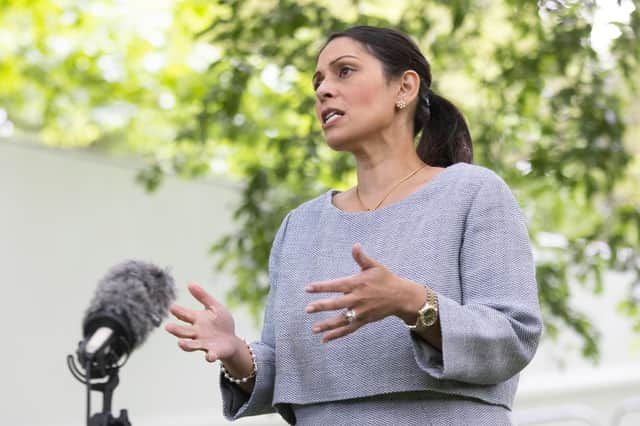The Tories need a leader to deliver Brexit to win the election - Brian Monteith


It cannot of course be true; some general elections are, inevitably, more important than others. Yet, as the importance of what’s at stake is talked up during the campaign it always feels to be of seismic importance, an existential threat, a turning point. It is only the passage of time that allows us to see which elections really were fundamentally historic or epoch-making.
The selection of the next Conservative & Unionist Party leader is usually treated in a similar cataclysmic manner, framed by the need to defeat the Labour Party and its leader, either to save us from more years of Labour “disasters” or to stop them taking power and turning the world upside down.
Advertisement
Hide AdAdvertisement
Hide AdThe selection of Boris Johnson and the subsequent General Election were of a different order. Yes, Jeremy Corbyn had to be beaten (not least as Theresa May had actually lost her majority to him) but the overriding issue was to find in May’s replacement not just an election winner but someone who could deliver on the EU referendum.
Delivering Brexit in some recognisable form so the country could move on and tackle the other big issues of the day was what framed the choice of Boris Johnson. It was no coincidence he ran on a ticket of “getting Brexit done” and it was the importance of this appeal that meant he could cut across past tribal loyalties and appeal to voters in the north of England who had backed Brexit and felt let down by Labour trying to frustrate the will of the people. The Red Wall, as it has become known, turned to Johnson and gave him his 80-seat majority believing he was their man.
I shall turn to what Johnson’s legacy will likely be in a later column, but after the Covid pandemic and his response of using repeated lockdowns and huge spending they required, the cost-of-lockdown-crisis is hitting everyone’s pocket. With Labour ahead consistently in the polls even Johnson’s Brexit legacy is not assured.
Whatever Keir Starmer says about not seeking to reverse Brexit is worthless. The Labour plan is as obvious as it is possible to be; blame any and every economic woe on Brexit – claiming it isn’t working – and offer to “sort” Brexit so his real intentions appear honourable.
Labour will seek to make Brexit “smoother” by reopening the Trade and Co-operation Agreement for negotiation (even though the EU repeatedly tells us not a single dot or comma can be renegotiated) and then accept whatever the Commission demands so that our laws are determined by them and we are aligned to their future laws. All without a referendum and no doubt some financial liabilities thrown in.
It remains to be seen just how many Conservatives are alive to the reality of the threat Labour poses to Brexit that changed the political landscape in their favour.
They cannot relegate Brexit as an issue of the past, quite the reverse, the Tory MPs need a leader who will exploit the opportunities that Brexit presents to the full and in good time before the next General Election. Yes, there is an ideological battle to be had on whether or not to cut taxes as a means to tackle inflation, but unless Brexit is not just done but its benefits are actually delivered and can be tangibly felt then Labour will have the opportunity to look reasonable rather than dishonest and disrespectful of the democratic settlement.
To make Brexit work has not been easy for the Johnson Government, facing as it has, the might of the British establishment in the Treasury, Home Office, Trade and DEFRA in creating obstructions, dragging their feet and introducing policies that are the antithesis of what was meant to be achieved (why maintain import tariffs on foods we don’t grow?)
Advertisement
Hide AdAdvertisement
Hide AdTo exploit Brexit will therefore require a political leader of great perseverance and courage and whose commitment to Brexit is beyond question.
This immediately rules out remainers such as Tugendhat, Hunt and Javid but it also rules out Penny Mordaunt who voted to support Theresa May’s meaningful votes on every occasion possible rather than resign on principle as had David Davis, Boris Johnson, and many others.
It also rules out Rishi Sunak, whose repeated and documented opposition to tackling the Northern Ireland Protocol more than cancels out his claim to be a Leaver of any substance.
Only Liz Truss, as a remainer, offers any possibility of making Brexit deliver, but she too has thus far only been willing to put forward a Northern Ireland Bill that requires secondary legislation through statutory instruments before it does what it claims.
The only candidates with Brexit credibility are the “Spartans” who voted against May’s betrayal of Brexit. True, Kemi Badenoch has strong credentials as a leaver but she did not join the Spartans and while I admire her speeches and pronouncements the task of defeating “the blob” would, I believe, be too great.
We are left then with Priti Patel and Suella Braverman of which Patel is for me the stand-out candidate. Having held various ministerial positions since 2010 she took on the unfit for purpose Home Office and managed – against all odds – to get her Immigration Bill through parliament and have the Rwanda policy – ironically the same as used by the EU and UN themselves. She has not just the ideology but the fortitude to beat Labour and keep the Red Wall blue. If the Tories are to win they need to deliver Brexit – and Patel offers their best chance to succeed where Johnson failed.
Brian Monteith is a former member of the Scottish and European Parliaments and is editor of ThinkScotland.org
Comments
Want to join the conversation? Please or to comment on this article.